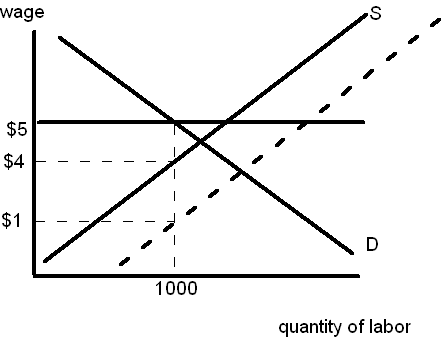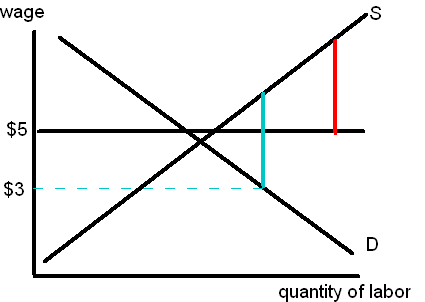Yesterday’s post touched on several related points, and I’m afraid the most important one got buried near the end, so I want to repeat it:
1) In the presence of an effective minimum wage, all benefits of the earned income tax credit are transferred to employers. This is, as they say, a matter of Economics 101. (Edited to add: As Bennett Haselton points out in comments, I should have said “dissipated”, not “transferred to employers”. The point remains that the benefits don’t go to the workers, which, for this discussion, is what matters.)
2) Paul Krugman argues that we should have an effective minimum wage in order to prevent some of the benefits of the earned income tax credit from being transferred to employers.
In this context, it should be remembered that Krugman ordinarily reserves his deepest scorn for those who, according to Krugman, willfully ignore the lessons of Economics 101.
Let’s review the argument for 1), with reference to the graph below. In the presence of, say, a $5-an-hour minimum wage, employers will hire 1000 workers. Because more than 1000 people want to work, employers can extract extra concessions in the form of reduced on-the-job-training, shorter breaks, and harsher working conditions. They can get away with exactly $1-an-hour’s worth of this, because even at an effective wage of $4, there are still 1000 people willing to work.
Edited to add: I am assuming that these concessions are of relatively little value to employers (otherwise they wouldn’t have waited for the EITC to demand them!), so that the quantity of labor demanded does not change.

Now let’s add a $3-an-hour earned income tax credit, which shifts the labor supply curve to the dashed position. Ordinarily, this would lead to a lower equilibrium wage, transferring some of the benefits of the EITC to employers. But in the presence of the $5 minimum, wages can’t drop, and employment remains fixed at 1000, though now even more people want to work, allowing employers to impose even harsher conditions until the effective wage drops to $1 an hour (the wage at which there are still 1000 people willing to work). This process transfers all the benefits of the EITC away from the workers.
Continue reading ‘Minimum Logic, Part 2’
 There are about a million reasons why I hate my iPhone, but this one pretty much sums it all up.
There are about a million reasons why I hate my iPhone, but this one pretty much sums it all up.







